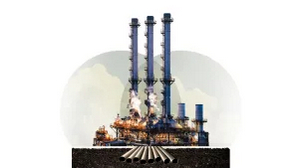Author
Dr John Hewson AM
is an honorary professor at the Crawford School of Public Policy,
Australian National University, and is a former leader of the Liberal
party. |
Kerry has already called out the climate emergency, emphasised that time is fast running out, and makes the critical point that existing Paris pledges are inadequate to meet the goal of keeping global warming below 2 degrees.
 |
| The government’s own forecasts warn of a catastrophic temperature rise of 4.4C by the end of the century. Credit: Nick Moir |
The costs of climate events are rising alarmingly, as evidenced for Australia by a Climate Council report on Wednesday of a looming annual $100 billion bill for natural disasters. Kerry has drawn attention to the cost of some $US350 billion ($452 billion) in one year after three storms.
A 2 degrees increase in temperature is specified by science as an “upper limit”, as a “guardrail”, or “tipping point”, beyond which global warming becomes an unstoppable chain reaction. Our children could face the prospect of their planet becoming uninhabitable in their lifetimes.
To stay below that limit the world has a finite carbon budget – a fixed amount of pollution we can emit over the next two to three decades. The next decade will be determinant. Hence the global focus on increased targets for 2030.
 |
| ‘Stark reminder of our fragility’: Pandemic prompts global surge in climate action |
Last weekend, he asserted (more a wish than a reality) that the political debate about reaching a carbon-neutral future is over, but he ruled out doing what other countries are doing: taking a new 2030 or 2035 target to the COP26 summit in Glasgow late this year.
Our Paris commitment to reduce emissions by 26 to 28 per cent from a 2005 base was political and it is inadequate to meet the Paris objective. A 26 per cent target is consistent with global warming of about 3 degrees and much more in Australia.
Recently, our Bureau of Meteorology gave evidence to the Senate that current world targets have Australia on track to warm by a catastrophic 4.4 degrees by the end of the century.
The initial recommendation of the government’s own Climate Change Authority, in 2014, was for a 2030 target of 45 to 65 per cent, if we were to pull our weight globally. Since then the CCA has been ignored and nobbled – indeed, the government sought to abolish it, the carbon price was repealed, emissions have risen, and the carbon budget has been plundered.
The government has refused to ask the CCA to update our remaining carbon budget. Its target ensures a climate catastrophe, while the opposition doesn’t really have one.
Recognising that Australia will need to offer a stronger 2030 target for Biden’s climate summit in April, and at COP26 in November, a group of our most senior climate scientists and I decided it was time for science and evidence to re-enter the debate. We formed the independent Climate Targets Panel to do the analysis and its report will be released on Thursday.
 |
| Victoria gets trillion-dollar bad news: sea level rises will swamp parts of the state |
Our panel included Labor’s former climate science adviser, the globally renowned Will Steffen, and other eminent experts, including those whose work has been adopted by the CCA. We used the CCA’s methodology and the government’s own figures.
The government has squandered so much of the carbon budget that the 2030 target now needs to be a 50 per cent reduction on 2005 levels, and net zero by 2045, if we are to stay below 2 degrees. If we don’t adopt these targets we blow our Paris emissions budget.
If we are to have any chance of reaching the tighter objective of the Paris Agreement, and upon which our Pacific island neighbours rely for their survival, namely to limit global warming to 1.5 degrees, then we must get to net zero emissions by 2035, with a 74 per cent cut by 2030.
 |
| What is carbon capture and storage (and does it work)? |
While a 2050 target may work for some countries, with lower emissions profiles, or that have done more of the heavy lifting, it is not good enough for Australia. Our analysis is consistent with what Britain and the European Union are doing.
The analysis maintains the 2014 view of the CCA that, reflecting the nature of our economy and energy system, even though Australia makes up 0.33 per cent of the world’s population, it is entitled to 0.97 per cent of the world’s remaining carbon budget. Some may think this “fair share” is too generous, but even with it the government’s targets still massively overspend.
It is madness for the Coalition and Labor to be contemplating more coal-fired power. Australia is already seen as a global laggard. There is no vaccine for climate change. The planet does not recognise politics, only how much pollution is emitted.
Links
- Q&A: Short-Term 'Tribal' Politics Is Failing On Climate Action, John Hewson Says
- Australia, The Climate Laggard, Could Lead The World: Over To You, PM
- Retirement Savings At Risk From Climate Change: John Hewson
- John Hewson Slams Coalition On Climate Change While Business Takes Lead Reducing Emissions
- John Hewson Urges Liberal Conscience Vote On Climate Emergency
- (AU) Our Survival As A Species Requires Urgent Action
- The Morrison government has abrogated responsibility for the climate crisis to the states - John Hewson
- Climate Change: John Hewson Accuses Coalition Of 'National Disgrace'
- We Can't Leave Climate Policy To Our Short-Sighted Politicians
- Fake News, Politicians' Dishonesty Skewing Climate Debate, John Hewson Warns
- (AU) John Hewson: The Morrison Government Has Abrogated Responsibility For The Climate Crisis To The States







